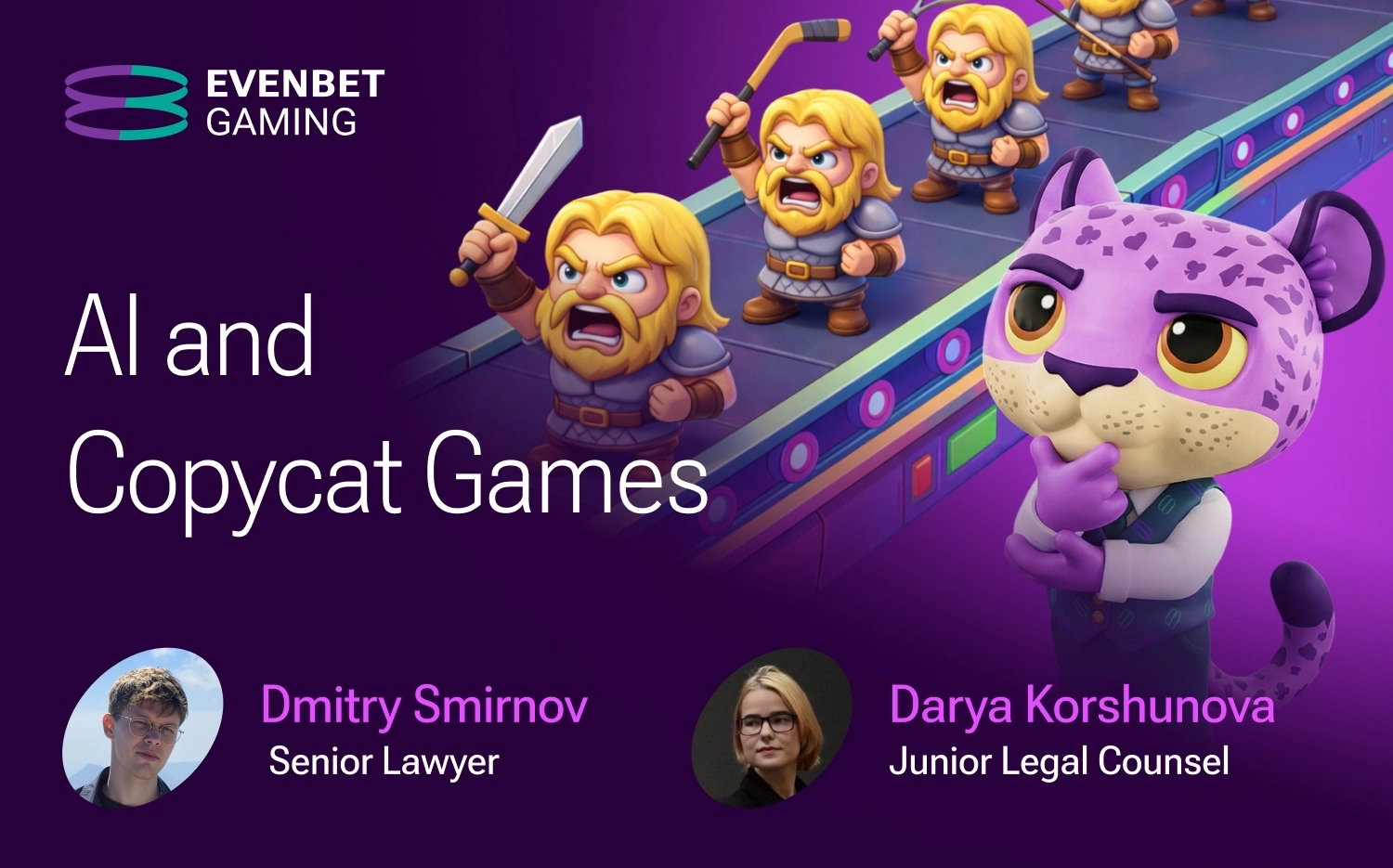Our poker product is designed to offer maximum flexibility for our clients. It enables operators to bring their unique business vision to life, to experiment, and to fine-tune the best configuration and feature set for their needs. However, this flexibility comes with a flip side: the software offers a wide range of settings, and knowing how to use them effectively is key. That is why at EvenBet Gaming, we place great emphasis on client onboarding, ensuring that each project operates at peak efficiency right from the very start.
Within our Customer Success Service, onboarding refers not just to familiarising clients with the product itself, but also to guiding them through the processes and planning involved. This journey consists of several stages, which we will outline in this article.
We are confident that every element of the process described here is essential. It reflects over 20 years of our experience in developing poker software. Almost every adjustment we have made to the onboarding journey stems from a practical lesson learned through hands-on experience.
0. Discovery: The First Contact with Customer Success Service
In the past, the Customer Success Service would only step in after the contract had been signed. This often led to complications: project information was passed on second-hand, important details could be lost or misunderstood, and the client’s team would find themselves having to explain their vision all over again to the account managers and technical team.
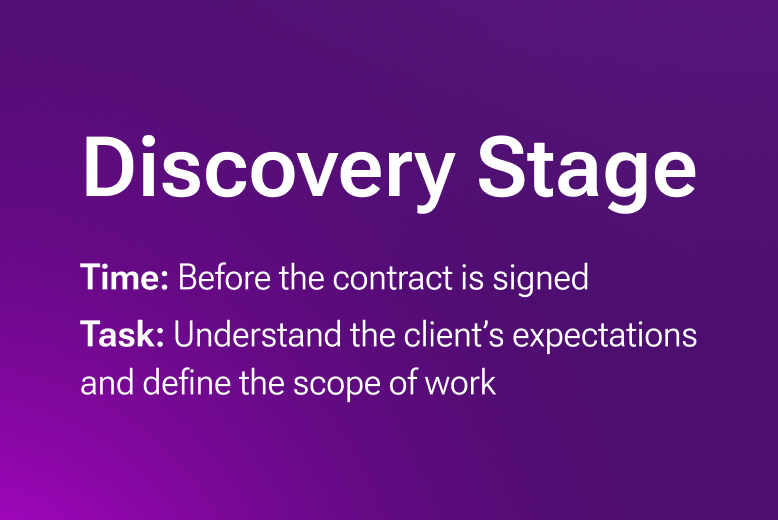
The reality is that every client comes to us with a different level of experience, and a Business Development Manager may unintentionally miss critical project details. For example, a client might request a mobile application for iOS. From a business development perspective, that’s no problem — we can certainly deliver it. However, it might later emerge that the client is unfamiliar with the specific requirements of the App Store, such as needing a developer account, a D-U-N-S number, and so on. If these issues are discovered too late, they can cause significant delays.
To solve this, we introduced the first point of contact between the Customer Success Service and the client during the discovery stage.
At this early stage, we discuss the nature of the project, what it will look like, the scope involved, and the client’s expectations. Relevant specialists join these meetings — experts who know where the pitfalls might be and who ask the right clarifying questions.
The Outcome of the Discovery Meeting
- The client gains a clear understanding of exactly what EvenBet’s team will deliver and within what timeframe.
- The project team, who will be directly involved, gains a thorough understanding of the workload and the client’s expectations. This allows for more detailed planning, more accurate timeline estimations, and a significant reduction in unexpected issues further down the line. In short, the team is fully prepared to start work.
The Discovery stage may take some time, but it ultimately results in a clear and unambiguous understanding of the client’s idea, while also helping the client grasp what they themselves will need to do for the launch.
1. Kickoff Meeting
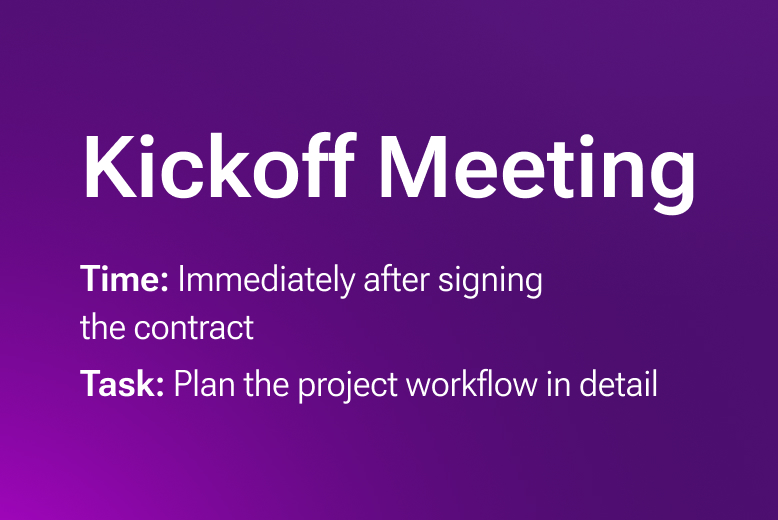
The kickoff meeting is the first session with the client after the contract has been signed — the true starting point of active project work. By this time, a dedicated account manager has already been assigned.
Work Plan
During the kickoff meeting, we once again walk through the upcoming work, now broken down into clear, manageable stages. The client gains a full understanding of what EvenBet’s team will deliver at each stage, and what actions will be required from their side.
We also agree on the regularity of follow-up meetings to discuss progress, tackle any current issues, and report on completed work.
Meet the Team
The account manager introduces the project team to the client. In the past, this step was overlooked, and EvenBet could sometimes seem like a “black box” to the client, leading to occasional misunderstandings. Experience has shown us that collaboration works best when transparency is prioritised.
Today, we make sure to explain how EvenBet Gaming is structured and how the various teams interact. Our goal is to make working with us as predictable and straightforward as possible.
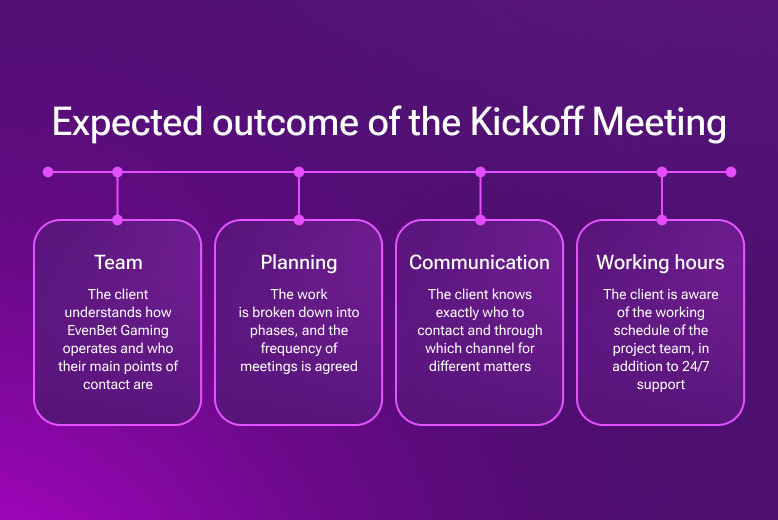
Communication Channels
We introduce the client’s team to our Support Desk system, which is used for reporting issues and submitting change requests. This tool is vital for us, as it ensures that all tasks come through in a structured format. It also gives the client complete visibility into the status of their requests, thanks to the Support Desk’s integration with our internal tracking system.
At this stage, we also set up a dedicated project chat, which includes both client representatives and the EvenBet team. This chat is intended for quick queries and urgent critical issues. During the meeting, we introduce the EvenBet team members who are added to the chat and explain their roles. Essentially, the client meets the people who will be driving the project forward and providing support whenever needed.
The project chat typically includes:
- Account Manager
- Process Manager
- DevOps Team
- Customer Support Team
- Integration Support Team (if the project involves integrations)
We also ensure that the Chief Customer Officer is included in the chat. This gives the client direct access to C-level management in case any communication issues arise, helping to resolve them swiftly and efficiently.
Working Hours
Our support team operates 24/7 to ensure that any critical issues are resolved as quickly as possible. However, other specialists — including account managers — work within defined business hours.
We always aim to assign account managers who are based in a time zone close to that of the client’s team, but it is important to clarify this early on to avoid any misunderstandings.
The Outcome of the Kickoff Meeting
- The client is introduced to the project team and understands how the team operates, including how to communicate effectively in different situations.
- The client gains a clear overview of the project launch plan, including what will be delivered at each stage.
- A communication system is established, ensuring smooth collaboration not only during the project launch but also throughout its ongoing operation and future development.
2. Product Onboarding
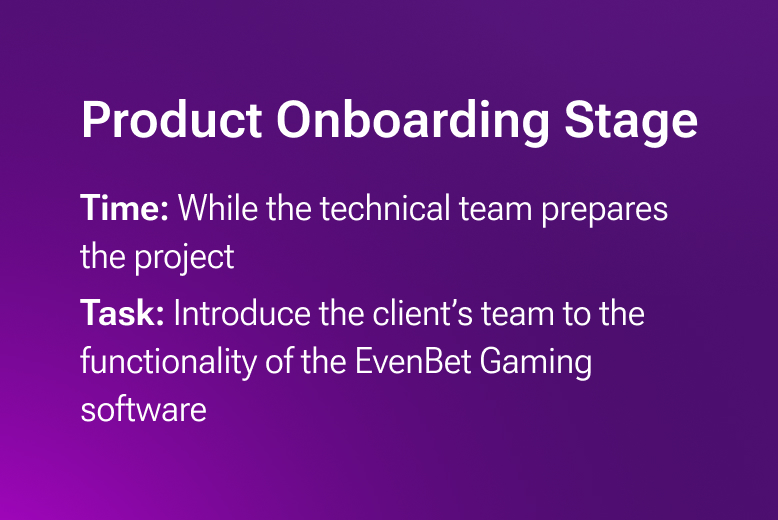
Once the room is launched, day-to-day operations are managed by the client. To do this successfully, the operator needs an operational team — the team responsible for scheduling tournaments, creating tables, and deciding which features to use to attract players.
Additionally, there should be a player support team on the operator’s side. In larger rooms, it is common to also establish a dedicated anti-fraud team. We deliver a series of training sessions to prepare these teams.
Basic Functionality Training
In this session, we cover how the platform works: how to create tournaments and tables, configure limits, and so on. We also explain the core game mechanics and how different features can (and sometimes should not) be combined.
Player Support Training
Separate sessions are held for the operator’s support team. These trainings cover:
- The tools available and how to use them,
- How to handle incoming information,
- How to perform verifications,
- How to quickly find information to resolve player issues.
Anti-Fraud Module Training
In these sessions, we explain how the anti-fraud module works, how to configure it, and how to manage and respond to incidents.
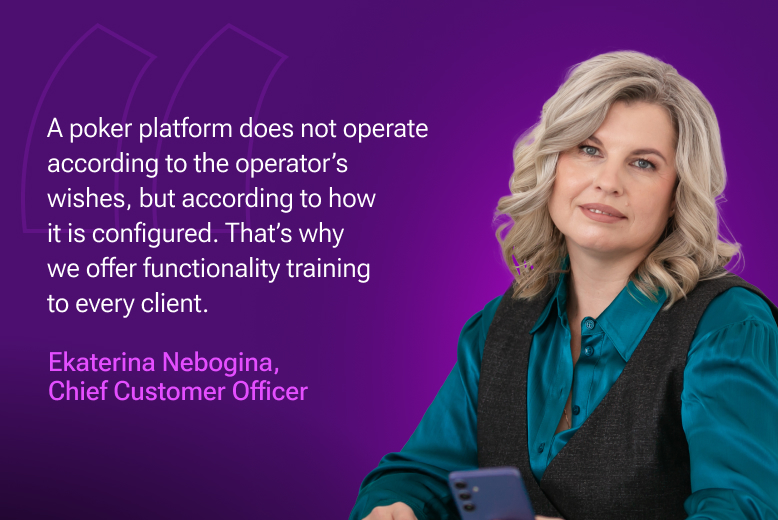
Previously, we only offered these trainings if the client specifically requested them. At that time, it was seen as an extra courtesy — we helped operators’ teams better understand our product. However, after encountering several situations where incorrect platform configuration led to issues post-launch, we realised that proactive training must become the standard.
Today, offering onboarding training is our initiative, not an optional extra.
We only skip these sessions if we are completely confident that the operator’s team is highly experienced and can easily navigate our documentation. Even then, we still hold at least one meeting to verify their level of expertise.
We are currently planning to record a series of video tutorials covering the basic topics. This will reduce the workload on our team and allow live sessions to focus on specific, project-related questions.
The Outcome of Product Onboarding
The operator’s team becomes fully capable of using the platform’s functionality and configuring it to work in line with their business model and overall vision.
3. Pre-Launch
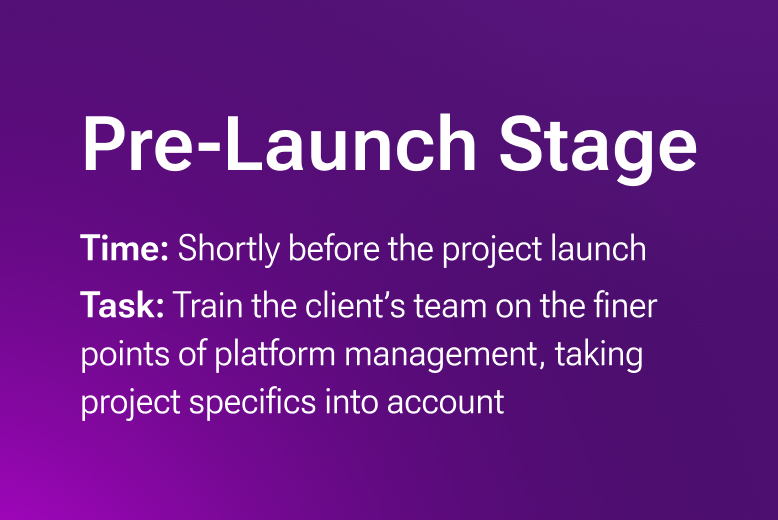
This stage begins when the project reaches technical readiness. Essentially, preparations for the actual launch are underway, and the gaming environment — the one that players will use — must be fully set up. At this point, the focus shifts to configuring live tables (not test environments), finalising the tournament schedule, setting up rake tables, prize structures for tournaments, promotional campaigns, and so on.
By now, the operator’s team is already familiar with the platform’s functionality. However, we still hold a series of meetings to ensure they fully understand how to apply it, taking into account the specific requirements of their particular project. We don’t simply hand over the software as a tool — we also share best practices and insights drawn from our experience across various markets and regions.
We always insist that this preparation is completed well in advance. It is tempting to start configuring the room just a day or two before launch, but if the team encounters unresolved questions at that late stage, it can lead to unnecessary complications. We are highly invested in ensuring a smooth and successful launch.
Additionally, we always ask about the operator’s short-term plans — particularly their upcoming marketing activities. Some choose a soft launch, gradually increasing player numbers, while others plan major promotions that lead to sharp spikes in traffic. This information is critical for us to prepare the necessary infrastructure and ensure the platform remains stable under any expected load.
The Outcome
The operator’s team is fully prepared to independently manage and operate their poker room.
4. Post-Launch
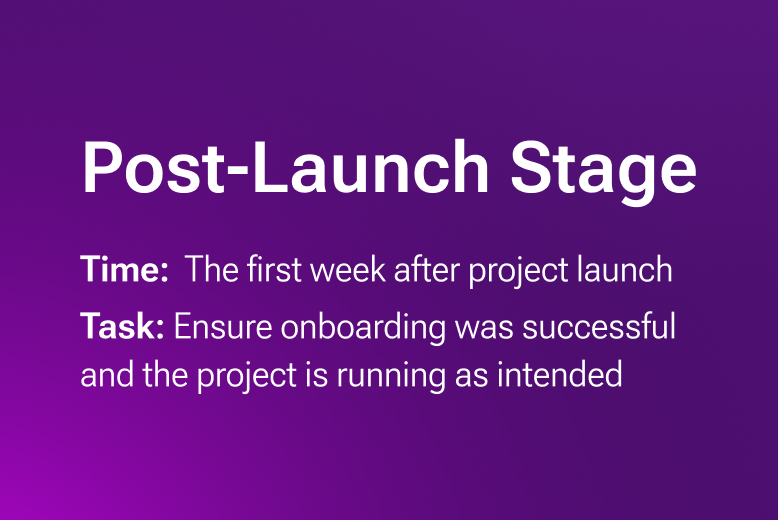
While we do not manage our clients’ poker rooms — it is their business, and they run it independently — we also do not simply leave them to their own devices immediately after launch.
Despite all the training sessions, the operator’s team may still encounter challenges or questions that did not arise during the preparation phase. That is why, during the first week after launch, we closely monitor the situation and provide proactive support where needed.
The Outcome
All outstanding issues are addressed, and the operator is now managing their poker room independently. The onboarding process is complete.
Ongoing Support
The poker room is managed independently by the operator. However, we continue to monitor the project’s performance, and from time to time our managers may offer suggestions on how to improve the room’s profitability.
Our developers also release new software versions twice a month. We inform our clients about updates and new features, and upon request, we provide detailed consultations on how to use them effectively.
In addition, our clients have access to an internal portal that contains information about various features, along with examples of marketing materials that can help operators promote new features to players and spark their interest.
Conclusion
No matter how high-quality and reliable a software product may be, it does not generate profit on its own. A strong and sustainable business must be built around it. Our company’s success is directly tied to the success of our clients. This is why we are committed to doing everything within our power to help them achieve it.
To be perfectly honest, over the course of our 20 years in business, we have lost our share of clients. It took time — and experience — to understand just how critical it is to establish close, open, and transparent relationships, and, more importantly, to understand exactly how to do this in practice.
The mission of the Customer Success Service at EvenBet Gaming is to work alongside our clients to create the clearest possible vision of the goals we are aiming for together, and to outline the actions each side must take to ensure our collaboration is as successful and productive as possible.
If you’re looking for an experienced technology partner who can build a productive working relationship and is ready to share their expertise, get in touch with our team.













